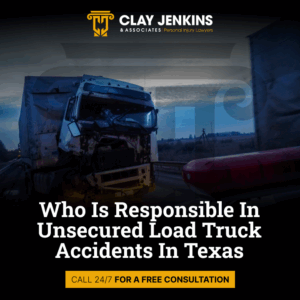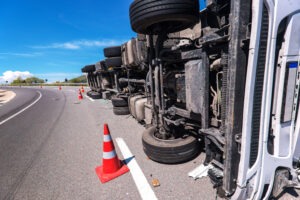
Who Is Responsible In Unsecured Load Truck Accidents In Texas
Picture this: you’re driving down a Texas highway when suddenly a piece of construction equipment crashes through your windshield, or you’re forced to swerve dangerously as lumber spills across multiple lanes ahead of you. These terrifying scenarios happen more often than most people realize, and when they do, lives are forever changed in an instant.
If you or a loved one has been injured in an unsecured load truck accident, you’re likely facing mounting medical bills, lost wages, and physical pain while wondering who will be held accountable. The aftermath of these accidents can feel overwhelming, especially when dealing with insurance companies and trucking corporations that seem more interested in protecting their bottom line than helping you recover.
You deserve answers, and more importantly, you deserve justice. Understanding who bears responsibility in these preventable accidents is the first step toward securing the compensation you need to rebuild your life. In Texas, the law recognizes that multiple parties often contribute to unsecured load accidents, and each one can be held financially accountable for their role in your suffering.
What Is An Unsecured Load Truck Accident
Unsecured load accidents represent some of the most dangerous incidents on Texas highways. These accidents occur when cargo falls from commercial vehicles due to improper securing, creating hazardous road conditions that can lead to catastrophic injuries and fatalities.
An unsecured load truck accident occurs when cargo falls from commercial vehicles due to improper securing, creating dangerous road hazards. Falling debris can strike vehicles directly, force drivers to swerve into traffic, or create obstacles causing multi-vehicle collisions. Common culprits include construction materials, lumber, machinery, and containers that become deadly projectiles at highway speeds.
For a free legal consultation, call (972) 938-1234
Who Is Typically Held Responsible In Texas
Determining responsibility in unsecured load accidents involves examining the actions of multiple parties throughout the cargo transport process. Texas law recognizes that several entities may contribute to these preventable accidents.
Responsibility often involves multiple parties, with liability determined by each party’s role in the accident.
Truck Drivers For Improper Securing Of Loads
Drivers bear primary responsibility for cargo securement. They must inspect loads before departure, use appropriate tie-downs, and monitor cargo during transport. Liability arises when drivers skip pre-trip inspections, use inadequate securing methods, or ignore signs of load shifting. Texas law requires drivers to ensure loads remain secure throughout transport.
Trucking Companies For Lack Of Training Or Oversight
Companies face liability for inadequate driver training, defective equipment maintenance, or policies that prioritize speed over safety. They’re responsible when unrealistic delivery schedules pressure drivers to skip safety protocols or when they fail to provide proper securing equipment. Corporate negligence extends to hiring unqualified drivers or ignoring safety violations.
Loaders For Not Following Safety Protocols
Third-party loading companies and warehouse personnel can be liable for improper loading techniques, using defective tie-downs, or failing to follow industry standards. Their negligence during the loading process directly contributes to accidents even when drivers and trucking companies act properly.
Vehicle Owners If Different From The Driver Or Company
Separate vehicle owners may share liability when they fail to maintain securing equipment, don’t ensure vehicles are suitable for specific cargo types, or neglect required safety inspections. Leasing companies can be held responsible for providing defective or inadequate equipment.
Laws Governing Unsecured Loads In Texas
Texas maintains strict regulations governing cargo securement, with both state and federal laws establishing clear standards for commercial vehicle operators. Understanding these legal requirements is essential for determining liability in accident cases.
Texas Transportation Code Requirements
Texas Transportation Code Section 725.021 mandates that loads be secured to prevent spillage or falling. Cargo cannot extend beyond vehicle dimensions without proper permits and safety measures. Violations result in fines up to $500, with potential criminal charges if accidents cause injury or death.
Federal Motor Carrier Safety Administration (FMCSA) Regulations
FMCSA regulations establish specific tie-down requirements based on cargo weight and type. Commercial vehicles must meet minimum securing standards, conduct regular inspections, and maintain compliance records. Federal standards often determine liability in court cases involving interstate commerce.
Click to contact our personal injury lawyers today
Determining Liability In These Accidents
Establishing fault in unsecured load cases requires thorough investigation and evidence analysis. Texas courts examine multiple factors when determining which parties bear responsibility for resulting damages.
Evidence Of Negligence, Such As Failure To Secure Load
Proving negligence requires demonstrating inadequate tie-downs, missing safety equipment, improper loading, or skipped inspections. Critical evidence includes accident scene photos, cargo securement analysis, and expert testimony on industry standards. Dash cam footage and black box data provide valuable insights into pre-accident conditions.
Violations Of Texas State Laws Or Federal Regulations
Documented violations of transportation codes or FMCSA regulations provide strong negligence evidence. Police citations, DOT inspection records, and compliance histories demonstrate patterns of unsafe practices. Regulatory violations often establish liability regardless of other factors.
Comparative Negligence If Multiple Parties Are At Fault
Texas follows modified comparative negligence, allowing fault distribution among multiple parties. Victims can recover damages if they’re less than 51% at fault. For example, a driver might bear 70% responsibility for improper securing while a loading company bears 30% for defective equipment, with damages allocated proportionally.
Complete a Free Case Evaluation form now
Types Of Damages Claimable
Victims of unsecured load accidents may be entitled to comprehensive compensation covering both economic and non-economic losses. Understanding available damages helps ensure full recovery for all accident-related costs and impacts.
Immediate And Long-Term Medical Expenses
Recoverable medical costs include emergency treatment, surgeries, rehabilitation, and future care needs. This encompasses current bills and projected expenses based on medical expert testimony. Severe injuries may require lifelong treatment, significantly increasing damage awards.
Lost Wages And Loss Of Earning Capacity
Compensation covers missed work during recovery and reduced future earning ability. Calculations include immediate lost income and diminished earning potential over the victim’s working life. Permanent disabilities can result in substantial capacity loss awards.
Cost Of Property Damage And Vehicle Repair
Property damages include vehicle repair or replacement, towing fees, rental expenses, and damaged personal property. These economic losses are typically straightforward to calculate and prove through repair estimates and receipts.
Non-Economic Damages Like Pain And Suffering
Texas allows recovery for physical pain, emotional distress, and loss of life enjoyment. These damages require documentation of how injuries impact daily activities, relationships, and overall quality of life. Pain and suffering awards can equal or exceed economic damages in severe cases.
Protecting Rights After An Accident
Taking immediate action following an unsecured load accident is crucial for preserving evidence and protecting legal rights. Proper documentation and timely legal consultation can significantly impact case outcomes.
Documenting The Scene And Securing Witness Statements
Photograph vehicle damage, debris patterns, road conditions, and visible securement failures. Collect witness contact information and statements about the accident sequence. Document cargo type, securing methods used, and any regulatory violations observed at the scene.
Reporting The Accident To Law Enforcement
Ensure police respond to create an official accident report. Request officers document apparent load securement violations and preserve physical evidence. Police reports provide crucial documentation for insurance claims and legal proceedings.
Seeking Immediate And Thorough Medical Evaluation
Obtain medical attention regardless of apparent injury severity, as symptoms may appear later. Complete medical documentation links injuries to the accident and establishes treatment baselines. Delayed medical care can weaken injury claims.
Consult An Attorney With Extensive Experience Handling Complex Truck Accident Cases
Trucking accidents involve complex federal regulations, multiple liable parties, and substantial insurance coverage. Experienced truck accident attorneys like those at Clay Jenkins & Associates navigate regulatory requirements, coordinate investigations, and ensure all responsible parties are identified and held accountable. Early legal intervention preserves evidence and protects victim rights.
We Make It Easy – Free Consultation With No Obligation!
Don’t let insurance companies minimize your claim or delay your recovery. The truck accident lawyers at Clay Jenkins & Associates offers free consultations for unsecured load truck accident victims, working on contingency fees with no upfront costs. You pay nothing unless we secure compensation for your injuries and losses.
Call or text (972) 938-1234 or complete a Free Case Evaluation form



